by Julie Pigott Dillard | Jan 25, 2019
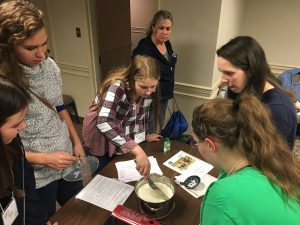
Can making mozzarella cheese really help you find your future career?
As an Extension Agent, I’ve attended numerous 4-H events through the years. Recently, I co-taught workshop at the National Youth Summit on Agri-Science at the National 4-H Center. Along with 4-H Dairy & Poultry Science Specialist, Chris Decubellis, FCS Agent, Jill Breslawski, and Dairy Regional Special Agent, Coleen Larson, we instructed 53 teens from 23 states in our two workshops!
Careers and Cheese…There’s a Connection!
Teens were introduced to agri-science during the keynote address by Mr. Ted McKinney, the Under Secretary of Agriculture for Trade and Foreign Agriculture Affairs. Summit sessions included introductions to career options and agri-science hands-on workshops. The questions and levels of interest were refreshing. I was most impressed with a young lady who expressed hesitation about attending the summit – she thought it would be solely farm-based topics. After she participated in our Exploring Dairy Science workshop (incorporating a presentation on a wide variety of careers available in the Dairy Science field and a hands-on activity making mozzarella cheese), she inquired about my career. As we discussed the vast realm of degrees one could hold to work as an Extension Agent and the wide variety of jobs available in Extension, she then shared she had found some direction for her future study in college when she entered as a college freshman in the fall of 2020.
Look Past the Title
Witnessing teens discover fields of study that meet their interests is the best reward! These type of 4-H youth opportunities help teens in so many ways. I encourage all 4-Hers to look past an event title, explore the event opportunities and keep an open mind. It could be a life changing experience!
For more information on 4-H in your county as well as state and national level events, contact your local UF/IFAS Extension office. Learn more about the Florida 4-H Dairy project.
This article was written by Marie Arick, UF/IFAS Extension Liberty County, County Extension Director & Family/Consumer Sciences Agent.
by Yolanda Goode | Sep 14, 2018
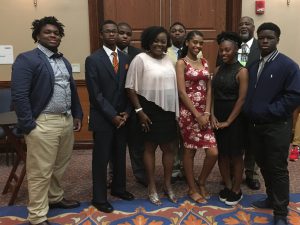
Gadsden County 4-H youth on campus for 4-H University. 4-HU is the premier youth leadership development event of Florida 4-H.
Leaders – Born or Made?
Many of us have heard the saying, “oh, that young man or woman is such a natural born leader.” But are leaders born that way, or do they develop into leaders? These Gadsden County delegates took advantage of 4-H University this summer – an awesome Florida 4-H state event designed to grow leadership skills. Many of them have also served as volunteer 4-H camp counselors during the summer. They understand that leaders are developed and not born.
What Defines a Leader?
Sometimes people confuse charisma with leadership abilities. Charisma is a special magnetic charm or appeal (Merriam-Webster Dictionary). Many of our local to national leaders have some level of charisma. In addition to charisma, leaders should have the more important skills such as communication, problem solving, critical thinking, managing, and self-awareness. There are many definitions for leadership because there is no universal definition. Leadership involves a process while a leader is the one who carries out the process.
How Does 4-H Unlock Your Leadership Potential?
One of my favorite teaching tools used to develop my Gadsden County 4-H leaders is the “Unlock Your Leadership Potential” by UF/IFAS Extension. It has influenced how I would define a leader. The overall goal of a good leader is to move the group or organization toward its goals while building a sense of togetherness and well-being.
Florida 4-H grows leaders at the club, county, district, and state levels by creating safe and nurturing environments and providing quality experiences. Knowledge and skills are great, but being able to apply them through experience is what fortifies and matures youth as well as increases their confidence. The 4-H slogan, “Learn by Doing”, is why the 4-H Experiential model is important to UF/IFAS-Extension 4-H Youth Development Program. The more active the youth and the duration of a their engagements in 4-H positive youth development the greater the benefits not just for them but also their communities (2013, National 4-H Council). It takes a whole team of Extension professionals, staff, 4-H Seniors, and volunteers to make the “magic” happen.
Call to Action:
- Begin the journey as a youth or volunteer: http://florida4h.org/getinvolved/
- Engage in local and state 4-H programs: http://florida4h.org/programsandevents_/
- Give to Florida 4-H: https://www.uff.ufl.edu/give-now/?fund_id=003603
- Read and share the other great blogs by my colleagues here: https://nwdistrict.ifas.ufl.edu/4hn/
- Join the “30 Days of Doing” 4-H Movement: https://4-h.org/inspire-kids-to-do/
References and Further Reading:
by Melanie Taylor | Jun 8, 2018
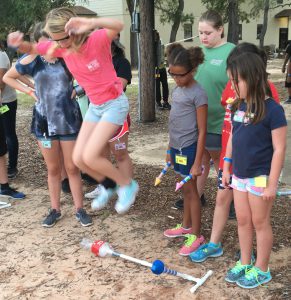
Gulf and Franklin County campers shooting rockets at Camp Timpoochee in June 2017.
As the school year wraps up, you’re likely trying to fill up your child’s summer with fun and educational programs. Fortunately, you’ll find a variety of day and residential summer camps out there. Does the thought of sending your child to camp cause anxiety for your or your child? If so, let’ me give you some tips to eliminate those concerns.
First, summer day camps and residential camps can be some of the most memorable events in a child’s life. Some children make memories and friends that last a lifetime. But as a parent, you need to feel comfortable about the camp you send your child to.
When starting the camp selection process, begin with your child’s interests. Make sure you know the camp will provide activities that will enhance your child’s personality and maturity level. Including your child in the process will help them feel more secure and excited about what camp will offer them. This will also help get rid of some of their anxiety because they’ll know what to expect (especially if they have never attended camp before).
Here are questions recommended by the American Camping Association (ACA) to help you make the best summer camp decision.
Questions to Consider in Selecting a Residential Camp:
- What locale do I want to consider? (mountains, oceanfront, distance from home, etc)
- Do I want a traditional camp that gives my child a wide variety of experiences, or do I want to select a specialty camp that focuses on a particular activity or set of skills?
- What size enrollment will make my child feel comfortable?
- How rustic do I want the camp to be?
- How structured do I want the program to be? Does my child like to have lots of choice in the activity schedule?
- Is my child ready to sleep away from home for an extended stay? (This will help you to select either a resident or day camp setting.)
- What session length will appeal to my child and to our family plans for the summer? (One week? Eight weeks? Length of day?)
- How can I stay in touch with my child during camp? Does the camp allow mail, phone calls or e-mail? Does the camp have parent visitation days?
- How will the camp meet my child’s special dietary or physical needs?
- What is my budget for camp tuition? (Remember, many camps offer financial aid.)
Questions to Consider in Selecting a Day Camp:
Day camps offer experiences unique from residential camps. Because of this, there are specific points to consider when choosing a day camp – transportation, overnights, swimming lessons, food service, horseback riding, group pictures, t-shirts, extended care, field trips, etc.
- Does the American Camp Association accredit the camp? (ACA has specific standards applicable only for day camps.)
- What training does the staff receive on safety, supervision, counseling, problem solving and other issues unique to working with young children?
- Is the price all-inclusive or are there extra charges?
- If transportation is offered, where is the closest pick-up location?
- Does the camp have an “express bus” which transports children quickly?
- If before and after-camp extended care is offered, who is with the children and what activities take place?
- Is lunch served, or do campers bring their own sack lunch? Are snacks and drinks provided?
- If the camp offers swimming, are there swimming lessons, or is it simply recreational swimming?
- Are campers in a group with a counselor all day? Or, are campers free to go from one activity to another with appropriate supervision? In this case, who would you talk to if you had a question or concern about your child?
- Is an open house offered before camp starts where you can meet your child’s counselor and van/bus driver?
- Are parents allowed to drop by for visits or is there a special parent visitation day?
Along with the above questions, you should also know that in the state of Florida, summer camps are not inspected or regulated by the Department of Children and Families (DCF). This makes it even more important for parents to gather information about the quality and safety of the program on their own. Parents should check to see if they are welcome to visit and observe the camp in action or attend activities with their child at any given time including water activities.
DCF suggests you ask these questions:
- What the programs health, safety and nutrition policies and procedures?
- Is the staff screened?
- What are the staff/child ratios and group sizes of the program?
- Is the staff well-trained?
- Is the program licensed or accredited?
- Are parents welcome to visit? Are family activities offered?
- Is there a daily lesson plan?
- Is the facility adequate for the number of children enrolled?
- What are the hours of operation, fees and payment procedures?
Download the Selecting Summer Care for School-Age Children: A Quality Checklist at http://www.dcf.state.fl.us/programs/childcare/docs/SummerChecklist.pdf.
Because you should know – Florida law does require summer camps to conduct background screenings of all camp personnel, including owners, operators, employees and volunteers. Volunteers providing less than 10 hours of service per month do not need to be screened as long as they are always within sight of a person who meets the screening requirement. In the state of Florida, the camps supported by UF/IFAS Extension meet each of the standards above.
The above questions and items to consider should help you in the camp selection process. Always feel confident in asking any questions – as the parent, you have the right to feel confident in your child’s camp selection.
As you begin your summer camp search, remember to check out the day and residential camping programs offered by your local 4-H program. We are confident in our volunteers and staff competency and would love to have your child participate in our safe and fun-filled summer camps. Contact your local Extension Office for more details.
Resources for this article may be found at: www.acacamps.org and www.myflfamilies.com.
by Niki Crawson | Jun 1, 2018
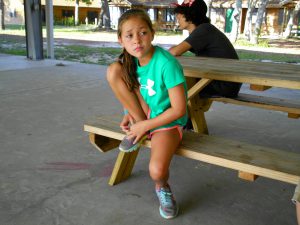
Oh, the distress and worry that begins the feverish panic of the homesickness bug! It typically bites the week before camp for most parents and campers and hits its highest peak by day two of camp. Unless quarantined, the homesick bug runs rampant and causes quite a disturbance during camp week. There is good news: homesickness is like most any other mild allergy or summer cold; it can be prevented with the right measures. If it does appear, it can be handled quickly so campers are on the mend and back to enjoying the fantastic summer activities of camp life with little disruption!
Campers who overcome homesickness and finish the entire week of summer camp successfully feel a sense of accomplishment and can also be praised for their demonstrating independence and problem solving abilities. These are life skills that 4-H residential summer camp strives to teach our youth so they can grow into successful leaders of tomorrow!
Homesickness is a normal part of overnight camp. Here are a few suggestions on how you can help manage homesickness to keep your children healthy and happy this summer!
PREPARATION IS PREVENTATIVE
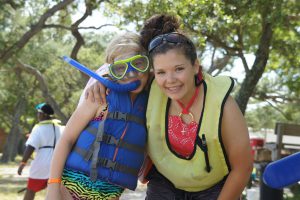
By going to camp orientations, meeting with camp staff, reviewing the camp schedule, and answering questions can help your child prepare for what to expect at camp. If possible, meet with the staff in charge to discuss any issues that may be giving your child anxiety about camp, or let us know of any issues at home that may be stressing your child. This might include include being assigned to a cabin with a friend, needing a nightlight when sleeping, etc. Having children involved in these discussions with staff in private will eliminate a lot of the anxiety, and in turn, reduce the chances and/or intensity of homesickness.
You can also allow your child to demonstrate independence early by letting them pack their own camp suitcase. This will allow them to feel more in control of their situation and the decisions they are going to make for a week, boosting their confidence. (Of course, you will want to check the bag for items they may have forgotten.)
POSITIVE REINFORCEMENT IS REASSURANCE
Parents can unwittingly set their children up for homesickness failure before camp even begins with just a few simple negative statements. Statements from parents expressing their anxiety or sadness about their children leaving home can be damaging and ultimately lay a foundation homesickness. Please don’t be this parent. Instead, reassure your child they’ll do great at camp, and reinforce that they will learn new things and become more independent.
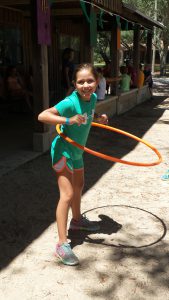
CONFIDENCE IS CONTAGIOUS
Parents, remain confident from the time you sign your child up for camp until his/her children return home. Emphasize the positives of the camping experience such as making new friends, learning new activities, swimming, etc. Keep your camper excited about the experience to help diminish the anxiety associated with the week.
Avoid giving your child the option of going home early from summer camp if he/she gets upset, sad, or homesick. Instead, speak with the 4-H agent to discuss possible actions that can be taken to remedy the emotions that the camper is feeling. Only as a very last resort should the parent speak with the child when a child is homesick; more often than not, it makes the homesickness worse.
TRUST YOUR 4-H STAFF
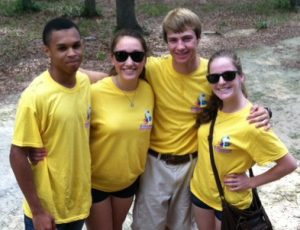
One of the hardest things to do may be one of the most important aspects of a successful summer camp for your child: trust your camping staff. From the beginning of the camp sign-up process, you can meet with your 4-H Agent or person overseeing the camping week. This will help you and your child feel more comfortable in their camp week. It will also help your 4-H Agent or lead staffer know more about their campers!
4-H residential summer camps are designed to support positive youth development to develop independence, promote a sense of belonging in a group setting, encourage generosity, and facilitate the mastery of targeted life skills. Programs at camp teach 4-H’s fundamental approach of “learn by doing” through safe, fun, educational environments.
To find out more information about 4-H residential camping programs, please visit http://florida4h.org/camps_/ or contact your local UF IFAS County Extension Office.
RESOURCES
http://florida4h.org/camps_/
https://www.acacamps.org/press-room/how-to-choose-camp/homesickness
by amgranger | Oct 5, 2017
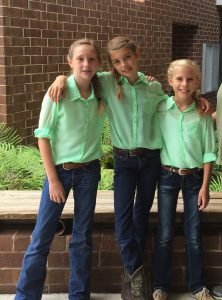 From its beginning, the 4-H program has used a system of clubs and competitive activities to promote learning and the development of specific skills of 4-H members (Ladewig & Thomas, 1987). Sometimes competition is viewed negatively. Florida 4-H does not believe that competition is beneficial for youth under the age of eight, but for older youth, competition can help promote the development of life skills. When you break it down, competition is simply the process of comparing skills (Midura & Glover, 1999). Competition provides opportunities for youth to master and demonstrate life skills that can be used in the real world. For example, livestock judging participants learn more than animal science- they learn about the ethical treatment of animals, how to communicate and critical thinking.
From its beginning, the 4-H program has used a system of clubs and competitive activities to promote learning and the development of specific skills of 4-H members (Ladewig & Thomas, 1987). Sometimes competition is viewed negatively. Florida 4-H does not believe that competition is beneficial for youth under the age of eight, but for older youth, competition can help promote the development of life skills. When you break it down, competition is simply the process of comparing skills (Midura & Glover, 1999). Competition provides opportunities for youth to master and demonstrate life skills that can be used in the real world. For example, livestock judging participants learn more than animal science- they learn about the ethical treatment of animals, how to communicate and critical thinking.
Weber and McCullers (1986) stated that “young men and women who traditionally attain the highest levels of achievement in the 4-H program are typically very successful ‘in other aspects of life as well.” Other studies have also shown that competition helps to decrease juvenile delinquency, foster responsible social behavior, stimulate creativity, motivate young people to set goals, prepare them for the competitive world and gain important life skills.
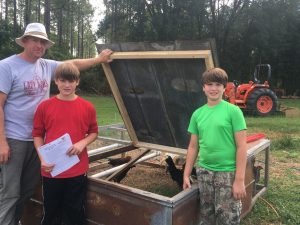 Competitions involving judging are beneficial educational tools used to prepare youth for the workforce, regardless of their chosen careers. Former participants have learned to become team players, which is essential to their success and efficiency in the workplace. Teambuilding skills are an essential element of success at any age.
Competitions involving judging are beneficial educational tools used to prepare youth for the workforce, regardless of their chosen careers. Former participants have learned to become team players, which is essential to their success and efficiency in the workplace. Teambuilding skills are an essential element of success at any age.
In a 2003 study conducted by the University of Idaho to determine development of beneficial life skills associated with past participants in 4-H Livestock and Horse Judging programs, over 97% of the judging alumni indicated that the Idaho 4-H judging experience positively influenced their personal success. The participants indicated gaining the following life skills:
- Ability to verbally defend a decision
- Animal industry knowledge
- Decision-making
- Oral communication
- Organizational skills
- Problem solving
- Team building
- Self-confidence
- Self-discipline
- Self-motivation
Overall, 4-H participants perceive that 4-H competitions are very valuable to them in terms of teaching responsibility, building self-confidence and self-worth, and preparing them to face challenges in a competitive world. Florida 4-H offers many opportunities to help youth develop through competitive events:
- 4-H record books
- Public speaking
- Demonstrations, or show and tell presentations
- Graphic design
- Photography
- Judging competitions
- Shooting sports
- Animal shows
- Fair exhibits
To learn more about competitive opportunities in 4-H, or how you can become involved as a coach or project leader, contact your local UF IFAS County Extension Office or visit http://florida4h.org.
Related Article- The Impact Ag Judging Had on Me
Resources:
https://www.joe.org/joe/2002june/a5.php
https://www.joe.org/joe/2006december/rb3.php
http://countryfolks.com/4-h-ffa-competitions-benefit-students-livestock-and-communities/
https://www.joe.org/joe/2002april/rb5.php
https://www.joe.org/joe/2005april/rb5.php
by pmdavis | Oct 2, 2017
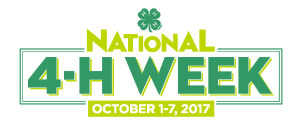 October is an exciting month for 4-H – we have some great things happening. First, it includes National 4 H Week, October 1-7. This year during National 4-H Week, The Northwest district is proud to celebrate the #TrueLeaders that make our community great. Every child deserves to be recognized for the great things they are doing. Help us celebrate #TrueLeaders during National 4-H Week by shouting out your favorite 4-H’er. #TrueLeaders lead by example, empowering their peers and inspiring communities. 4-H’ers, show your pride this National 4-H Week! Share photos of how youth are stepping up as #TrueLeaders in your county.
October is an exciting month for 4-H – we have some great things happening. First, it includes National 4 H Week, October 1-7. This year during National 4-H Week, The Northwest district is proud to celebrate the #TrueLeaders that make our community great. Every child deserves to be recognized for the great things they are doing. Help us celebrate #TrueLeaders during National 4-H Week by shouting out your favorite 4-H’er. #TrueLeaders lead by example, empowering their peers and inspiring communities. 4-H’ers, show your pride this National 4-H Week! Share photos of how youth are stepping up as #TrueLeaders in your county.
As part of National 4-H Week, 4-H’ers participate in 4 H National Youth Science Day (NYSD), the world’s largest youth-led science experiment. This year’s 4 H NYSD event will take place on October 4.
Our local Tractor Supply Company will be supporting 4-H clubs October 4-15 with their Paper Clover Campaign, this is a national in-store fundraiser that benefits state and local 4-H programs. Tractor Supply invites friends and family to support 4-H by donating $1 at store checkouts for scholarships that send local kids to 4-H camp and other 4-H leadership experiences.
October also represent a time when our local tailgating youth will advance to the state finals. The northwest district will have 8 youth advancing to the state competition October 14.
October also means that it is fair time! You will be able to view our 2017 4-H youth exhibits across the Panhandle at local fairs and rodeos!
Central Panhandle Fair – October 2 -7
Art in the Garden Festival at the UF IFAS Research Center in Quincy- October 7th
Bonifay Rodeo – October 5-7
Walton County Fair – October 9-14
Panhandle Youth Expo– October 11th-14th
Pensacola Interstate Fair – October 19-24
North Florida Fair – November 2-12
Local 4-H youth will exhibit their artwork, plants and animals that they have been caring for this past year. Youth exhibits and plants are judged. Youth receive ribbon awards using the Danish judging system at county and regional fairs. This means that exhibits are judged against a “standard” rather than against other exhibits. For example, a painting that has been created by a 4-H’er is not compared to other paintings. Rather, it is judged according to the criteria of standards for paintings. A blue ribbon means that the exhibit meets high standards and good quality work is shown.
October and November are busy months in 4-H. To find out more information about other 4-H programs like this or volunteer your time to work with youth, contact your local UF IFAS County Extension Office or visit http://florida4h.org.










